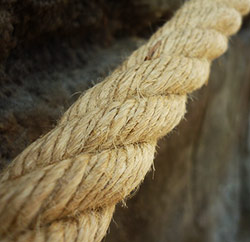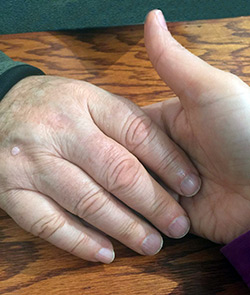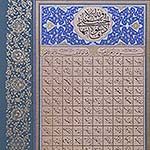The Role of the Shaykh
Every true shaykh has been appointed to the task of teaching tasawwuf, known in the West as Sufism, by his own shaykh, who was previously assigned by his shaykh, and so on, in a line that stretches back to Prophet Muhammad (peace be upon him). Each of the several schools, or tariqas, of Sufism, is thus supported by its own ancestral lineage of spiritual teachers, called silsila. Every silsila is documented in writing, and each line of descent, though distinct, proceeds from the authoritative decree of Prophet Muhammad (pbuh). In the act of initiation into a Sufi tariqa, the murid (Sufi student) makes spiritual connection not only with his own shaykh, but with the entire chain of shaykhs within the Sufi order to which his shaykh belongs. In taking hand with all of his shaykh’s spiritual ancestors, the murid makes a bond ultimately with the Prophet (pbuh) himself. This connecting with his silsila is what Sufis regard as “holding onto the rope” of Allah.

And hold tight to the rope of (connection to) Allah altogether, and do not be divided, and remember Allah's grace to you when you were enemies. He brought your hearts together, so that you became like brothers with His grace, and when you were upon the edge of the pit of fire and He saved you from it. This is how Allah shows His ayats (revelations) to you clearly, so perhaps you will be among those (who choose to be) guided. (Qur’an 3:103)

The shaykh’s job is to help his murid reach the realization of Allah within himself and to protect him from spiritual danger. As tariqa is the bridge between the inner and outer worlds, the shaykh is the conductor who leads the way across, a living link between outer and inner. He has his feet in both worlds at all times, having been to the other side and sent back, in order to guide his children to their spiritual destination. The shaykh is a wali (protecting friend; saint) working visibly in the world, receiving guidance from his pirs (spiritual ancestors in the silsila) in the unseen.
None will have any power of intercession, except the one who has taken a covenant with Al Rahman (The One Who Acts with Mercy). (19:87)
Our Pir, Shaykh Abdul Qadir Geylani said:
In the hadiths (traditions; sayings attributed to, or anecdotes regarding Prophet Muhammad (pbuh), according to traditional eyewitness accounts) it is seen that the Prophet (pbuh) took a word from his sahabe (companions) that they were going to obey Allah. Thus taking one's word, i.e., biat (making a pact), is modeled after such occasions, and is what makes it legal.
The shaykh must have reached an advanced state of inner development to be an effective guide on the path of tasawwuf. In order for him to lead his murid to connection with his inner self, the shaykh must have traversed this territory himself, as it is otherwise impossible to show the way.

The inner evolution of the shaykh has brought him through the four doors of tasawwuf: from sharia, which is what Muhammad (pbuh) said, through tariqa, what Muhammad (pbuh) did, through haqiqa, the secret of Muhammad (pbuh), to the state of marifa, the being of Muhammad (pbuh). The mature shaykh has been to the very core of being, at one with the essence of Allah, and back again, upon Allah’s command through His Prophet Muhammad (pbuh), to lead his children to that promised land. He is the point in which all of the pertinent knowledge is gathered, the interface between the seen and the unseen.
The conditions of a true shaykh are the following:
1) He follows the sharia.
2) He speaks about what is in your heart, and answers questions that you have not spoken aloud.
3) When you are in his presence, you forget your troubles, as he takes your load.
4) He praises Allah and not himself.
5) He has a silsila and ijaza (license) to teach the path.
Praise Allah Only But Respect the Shaykh
by Shaykh Taner AnsariOne must follow certain principles in order to attain closeness to Allah. A student's relationship with his or her teacher is very important in this regard. Shaykh is not your friend. Shaykh is an employee of Allah who is helping you to have a relationship with Allah. It is your job to respect the door or the means through which you are getting Allah's knowledge. The critical point is this: It is Allah who is teaching you through the shaykh; you have to remember this. Your biat (initiation) is to Allah, your focus is on Allah, your target is Allah, your beloved is Allah, what you yearn for is Allah; don't forget this. All praise is due to Allah, as is mentioned in sura Al Fatiha (the first chapter of the Qur'an). Some people praise their shaykh because they are told Allah's light is shining through their shaykh's face. Seeing this yourself is one thing and being told that this is so is another thing. You have to act according to your own spiritual level. Otherwise, you can fall into shirk (associating partners with Allah). Even if you see Allah's light in your shaykh, your job is to praise Allah, no matter what. As Allah The Most High says in the Holy Qur'an: "Look at the sun, but adore Allah who created it." So don't go too far in praising your shaykh, just respect him or her. Simple titles are sufficient. No shaykhs praise themselves, no prophets praise themselves; they all praise Allah. Why don't we all do that?
Unless a shaykh attains the following twelve virtues in himself, he cannot sit on the sajada (prayer rug) of annihilation and wear the sword of being a helper. Two virtues are from Allah, two are from the Prophet (peace be upon him), two are from Abu Bakr, two are from Umar, two are from Osman, and two are from Ali, may Allah be happy with all of them.
The ones from Allah are: sattar (covering of shame or shortcomings), and ghaffar (forgiving much).
The ones from the Prophet are: shafiq (extreme kindness, mercy), and rafiq (extreme softness).
The ones from Abu Bakr are: sadiq (loyalty), and mutasaddiq (much alms giving).
The ones from Umar are: amri maruf (strongly enforcing right action), and nahy-i-munkar (forbidding ill deeds).
The ones from Osman are: mitam (hospitality), and musalli (praying during the night when everyone else is sleeping).
The ones from Ali are: alim (knowing), and shuja (courage).
If a shaykh doesn’t have the following five virtues, he will be a dajjal (misleader) who will lead the people into ignorance:
1. Outwardly, he should know sharia.
2. Inwardly, he should be researching haqiqa (the state of knowledge of the truth).
3. He has to serve his guests with a smiling face.
4. He must treat the poor kindly, saying nice words to them. This is the praised shaykh, who knows haram (what is forbidden) and halal (what is permitted).
5. He knows how to tame his own nafs (egoistic or animalistic nature) and how to tame the nafs of the wayfarers to haqiqa.
The person who is going to be a shaykh has to know the religious and natural sciences, and the terminology of the Sufi masters. If he does not know these, he cannot be a murshid (master). Junaid, may Allah be pleased with him, says, “Our knowledge depends on the Book of Allah (Qur’an) and sunna (observed behavior) of the Prophet. The one who does not memorize the hadith (sayings attributed to, or anecdotes regarding Prophet Muhammad [pbuh], according to traditional eyewitness accounts) and write it, who does not know the great Book and the terminology of the Sufi masters, who does not have any knowledge of the religion, is not a person among the ones who do irshad (teach enlightenment). As for me, the person who takes the responsibility of training and raising the murid must do this for Allah’s sake, not for his nafs (ego). When he is raising him, and inviting him to fight against his nafs, he must be kind, caring, and soft, as a father and mother treat their children. First, he has to show him the easy ways, and not give him or her a load he cannot carry. After he takes a word from him that he is going to leave his ill deeds and start praising Allah, then he can slowly, step by step, give him heavier assignments.
The person who wants to train himself without a shaykh is actually trying to raise a building without a foundation. A person who is not raised by masters, and did not get sacred milk from them, is like a child left in the middle of the street. If a person does not wear the clothing of taqwa (self-vigilance) in the hands of an alert and authoritative master, he will fall into the trap of his nafs, and his nafs will play with him as it wants, and it will lower him to baseness. On the other hand, the one who holds a strong handle will be able to see the secret of his existence, and he will be submersed into endless favors and pleasures of Allah. The murid who follows his nafs and who does not listen to his shaykh is really denying himself his portion in life.








